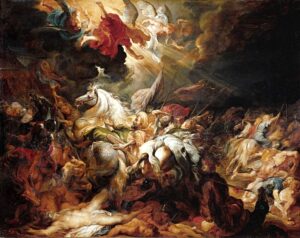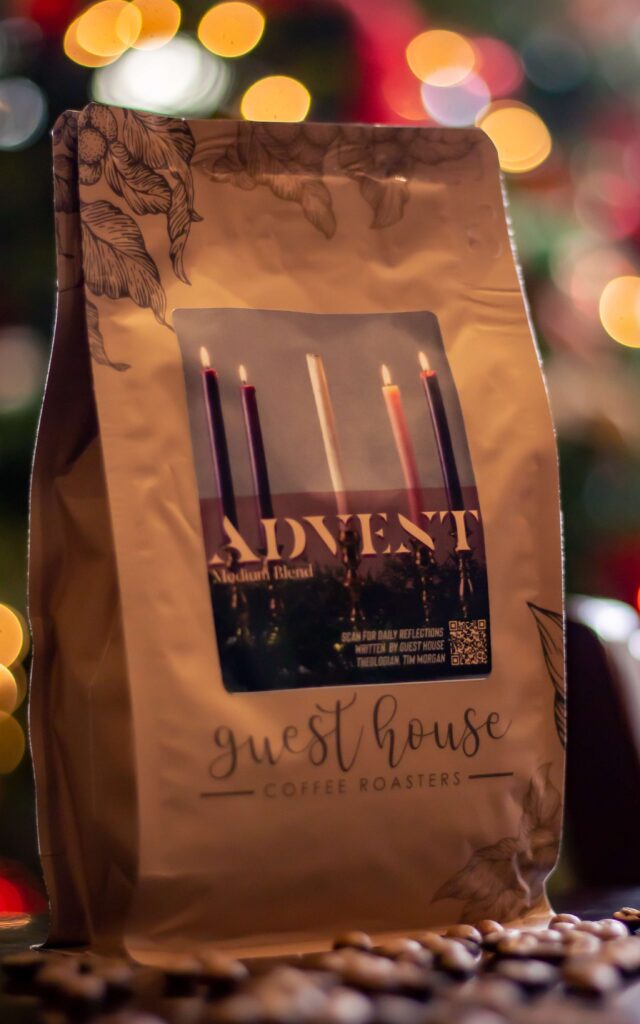
Image of the “The Defeat of Sennacherib” painted by Peter Paul Rubens (ca. 1612) taken from https://www.peterpaulrubens.net/the-defeat-of-sennacherib.jsp.
And death shall have no dominion.
Dead men naked they shall be one
With the man in the wind and the west moon;
When their bones are picked clean and the clean bones gone,
They shall have stars at elbow and foot;
Though they go mad they shall be sane,
Though they sink through the sea they shall rise again;
Though lovers be lost love shall not;
And death shall have no dominion.
– And death shall have no dominion, Dylan Thomas
“To you, O Lord, I cry, And to the Lord I plead for mercy: ‘What profit is there in my death, if I go down to the pit? Will the dust praise you? Will it tell of your faithfulness? Hear, O Lord, and be merciful to me! O Lord, be my helper” (Psalm 30:8-10).
Our representations of Jesus’ nativity often boil out the turmoil and turnovers, complexity and crises of its events. The Gospel of Matthew underlines exactly this aspect of Christ’s birth. It opens the story, “Now the birth of Jesus Christ took place in this way” (Matthew 1:18). Immediately, before any angels or dreams or songs of praise, Mary and Joseph’s situation is introduced as scandalous. She’s betrothed to Joseph, but “before they came together she was found to be with child” (Matthew 1:18). So, Joseph intended to divorce her (Matthew 1:19). Then an angel appeared to Joseph in a dream disclosing the nature of the situation, that the child “is from the Holy Spirit” (Matthew 1:20), that they’ll name him Jesus, and that he’ll save his people. He directs Joseph’s attention to what God is doing in Jesus’ birth, in Joseph and Mary’s situation. Matthew tells us, “All this took place to fulfill what the Lord had spoken by the prophet: ‘Behold, the virgin shall conceive and bear a son, and they shall call his name Immanuel’ (which means, God with us)” (Matthew 1:22).
What’s going on in Jesus’ birth? Trying to get at that question, we’re transported to the sign which Ahaz king of Jerusalem tells God’s people that God will provide in view of Syria and Israel’s siege of the city. It’s a signal of God’s victory in the midst of apparent defeat. Immanuel, Ahaz foretells, will come accompanied by destruction. “In that day,” Syria and Israel will be emptied of peoples and wealth, plagues will overtake them, the character and detail of their lands will be shaved smooth, “briers and thorns” will close the earth’s womb (Isaiah 7:16-8:4). A foreign river will drown their own channels and will flood over into Judah, its currant dragging God’s people to the depths. Immanuel, however, will remain the pillar which weathers this storm, for he is God’s word of promise, his sure sign of victory. Immanuel is the stone across which the peoples are shattered, the great void in which their word falls silent (Isaiah 8:9-15). The earth may be barren and desolate, but God’s word is unfailing. Immanuel, “God with us,” is indomitable.
The psalmist writes, “Sing praises to the Lord, O you his saints, and give thanks to his holy name. For his anger is but for a moment, and his favor is for a lifetime. Weeping may tarry for the night, but joy comes with the morning” (Psalm 30:5). In the apparent scandal of Joseph and Mary’s situation, God’s word “Immanuel” secures the favored woman whom the Lord was with (Luke 2:28). In the scandal of Jerusalem’s siege by Israel and Syria, and finally by “the king of Assyria and all his glory” (Isaiah 8:7), God’s word “Immanuel” is a sanctuary for those who honor and fear him (Isaiah 8:13). And in the scandal of Jesus’ looming death, God’s word “Immanuel” is the sole foothold (yet strong and ever wide; “the broad place,” Psalm 18:19; 31:8) which keeps us from Satan’s threshing floor (Luke 22:31-32).
With this word of promise, God makes a claim and a demand. God’s claim is that nothing, absolutely nothing, not tribulation, or distress, or persecution, or famine, or nakedness, or danger, or sword (Romans 8:35) will withstand, frustrate, or overcome God’s mission. The lone Immanuel, “numbered with the transgressors” (Luke 22:37; Isaiah 53:12), is the point of departure and return for God’s mission, the Archimedean point for what God’s doing in the world. In God’s inevitable victory, Immanuel proclaims (and we in him), “You have turned for me my mourning into dancing; you have loosed my sackcloth and clothed me with gladness, that my glory may sing your praise and not be silent. O Lord my God, I will give thanks to you forever” (Psalm 30:12). God’s demand is that we become the sign which Immanuel is: following the coming Jesus, we get in on God’s mission and become the signal of his impregnable victory. In this respect, “if anyone is not willing to work, let him not eat” (2 Thessalonians 3:10). The economy of work in God’s kingdom is organized and enlivened by Immanuel. Paul writes of the idle, the busybodies (who talk their way around getting in on what God’s doing), “Now such persons we command and encourage in the Lord Jesus Christ to do their work quietly and to earn their own living [literally, ‘eat their own bread’]” (2 Thessalonians 3:12). In our place, with our people, in our work, we are signs of God’s victory.
Today, I’d ask you to consider the situation which you are at work in before the coming Christ. The world exhales its long, violent last breath. Its stage is fraught with “blood and fire and columns of smoke” (Joel 2:30). We are run over, run through with unceasing troubles. Amid this, people grumble and gossip in search of position (2 Thessalonians 3:11; see 1 Timothy 5:13), in fear of conspiracy, subject to the twists and turns of worldly threat (Isaiah 8:12). God’s demand, on the other hand, is that we work quietly. Why? He has already won. And we signal that.
Further Reading: Psalm 30; Isaiah 8:1-15; 2 Thessalonians 3:6-18; Luke 22:31-38
Written by Guest House Theologian, Tim Morgan. These reflections are a complimentary addition to our Advent Blend Coffee Bags. Scan the QR code each day to read the most recent reflection.

More Advent reflections can be found here.